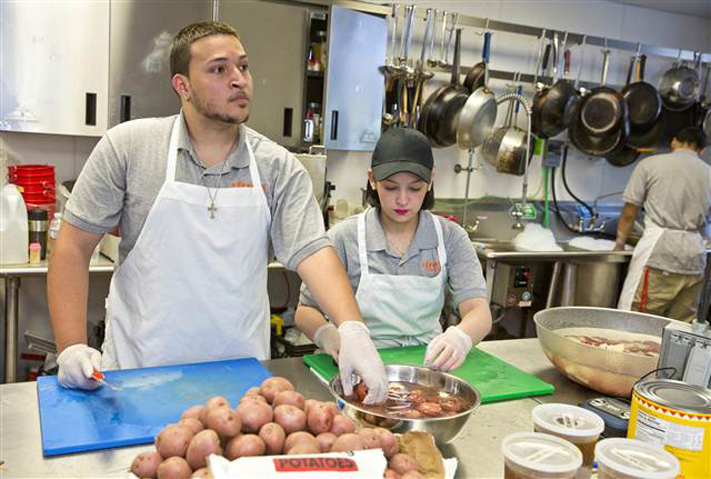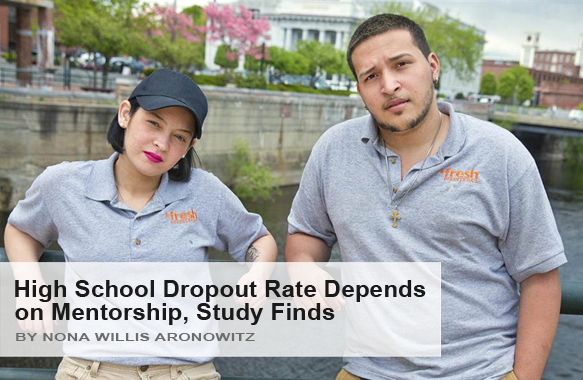Photograph; Luis Mateo and Kasandra Vega, who both left high school without a degree, are involved in the culinary program of the United Teen Equality Center, in Lowell, Mass. | Evan Richman / For NBC NEWS
“It was like, ‘where do I belong?’” he said. “I didn’t have support from
Mateo went to the guidance counselor’s office a couple of times to address the bullying, but says he only felt lectured there. One day, after a blowup with his mother, Mateo says she kicked him out of the house. The next day, he got in a physical fight with one of his bullies. That’s when he went to the guidance office and announced that he was leaving school. The counselor urged him to stay, but it was too late.
Mateo’s experience reflects many of the voices in “Don’t Call Them Dropouts,” a new report released Tuesday by America’s Promise Alliance, based on research conducted by the Center for Promise at Tufts University. Culled from in-depth interviews with 200 young people and nationwide surveys from 2,000 people ages 18-25, the study is the largest of its kind about teens who don’t earn a high school diploma—about 20 percent of kids who enter high school.
The study found that young people leave school not because of a single event but due to a confluence of factors, including a violent home life, an incarcerated parent, or homelessness. Sixty-six percent of these young people experienced from three to 12 of these challenges, with almost one-quarter experiencing at least six.
Jonathan Zaff, executive director of the Center for Promise, said the problem isn’t that these kids lack grit—it’s that they become overwhelmed and often find themselves without support. If there was one predictive question, he said, it was, “Is there an adult in your community you can turn to for help?”
“If the answer was no, [the young person] was much more at risk,” said Zaff. “It’s crucial to have several adults in their lives who can guide them and support them and have expectations for them.”
''It seemed like the best thing was to sit back and say, ‘OK, I have to leave.'
Many kids “are reaching and trying and sometimes they’re getting the door closed on them, literally and figuratively,” Zaff said. And even if the adults are responsive, many give up too soon: “The assumption is if we reach out to them, and they don’t immediately accept our help, then it’s their fault they didn’t finish high school.”
Jennifer Silva, author of Coming Up Short, a book about working class young adults, said many teens at risk of dropping out learn at an early age to only count on themselves.
“Everyone grows up thinking school is where you’re supposed to succeed,” said Silva. “So when high school becomes a site of betrayal and bewilderment, it makes them feel like, ‘I shouldn’t depend on anyone.'”
During her research, Silva found that seemingly minor things—not being sure where the guidance counselor’s office was, not knowing which hotline to call—can frustrate and derail young people who are in need of support.
“It’s these step-by-step processes that seem really obvious if you’re middle class,” she said.

Luis Mateo and Kasandra Vega work in the kitchen of the culinary program of the United Teen Equality Center, in Lowell, Mass. | Evan Richman / For NBC NEWS
And there are the teens who feel too ashamed to reach out. When Kasandra Vega went from her neighborhood school to a private Catholic high school, the transition was “academically overwhelming,” said Vega, now 22. Her grades began slipping and she started drinking and smoking. Yet she didn’t approach any teachers for help, and didn’t want to burden her mom. “I felt embarrassed I didn’t understand the coursework,” she said. “[The teachers] had high standards, and they didn’t expect anybody to fail.”
When she found out she was pregnant at 16, she retreated from school even more. “I felt like I’d let everybody down,” she said. “It seemed like the best thing was to sit back and say, ‘OK, I have to leave.'”
'One guidance counselor for every 1,000 students is not going to cut it.'
Once struggling teens conclude that the adults in their lives are of no use to them, they tend to seek connection in far less productive ways, the study found. They’ll join gangs, for example.
“[Gang members] told me, ‘Come on, we’ll treat you like family,’” recalled Mateo, now 23. He resisted the temptation, because he had witnessed much of the violence and arrests that come with that pledge. But he understands why a lot of his peers are attracted to the acceptance of a gang. “If you’re offering somebody a place to belong, they’re going to take it”—and they’re going to drift further from school as a result.
Both Mateo and Vega eventually did find mentors, in the form of their transitional coaches at United Teen Equality Center, an organization in Lowell that provides young people who left high school with workforce training and GED classes. Gregg Croteau, the center’s executive director, said part of what UTEC does is provide that “one consistent, caring adult” that may not have been present during high school.
“[Teens] need that adult that makes them feel like they’re part of a community,” said Croteau. They need business owners from their neighborhood who can train them. They need schools that encourage interactive learning, so kids stay actively engaged.
And schools should “have that intentional philosophy [of creating] a sense of community,” said Cocteau. “It can’t just be luck of the draw, getting that one good teacher who cares.”
There are, of course, teachers and community leaders who are naturally skilled at connecting with teenagers and fiercely devoted to at-risk kids—“magicians,” Zaff calls them. But he said there simply aren’t enough to go around. Not only is “one guidance counselor for every 1,000 students not going to cut it,” but those counselors and other adults have to recognize when a teen is asking for help, and have to be persistent. A teacher of Vega’s, for instance, once offered to tutor her, but she turned him down—and never got such an offer again.
Zaff envisions an “army of magicians,” people who adopt the philosophy of mentors at places like UTEC or Self-Enhancement, Inc. in Portland, Oregon, where they’re in the habit of saying, “I put my last name on that young person. They’re now family.”
Of course, it’s impossible to give every kid a formal mentor; these nonprofits have limited bandwidth.
But these bonds can be formed “in all sorts of informal ways,” said Zaff. “We should get as many adults as possible to say, ‘I’m putting my name on you.’”
Originally Published at NBC. May 19th 2014, 5:47 pm
Nona Willis Aronowitz reports on education for NBCNews.com. Previously, she was a fellow at the Roosevelt Institute, a staff writer at GOOD magazine, an associate producer for National Public Radio, and a local reporter for the Chicago Tribune. She is the co-author of “Girldrive: Criss-crossing America, Redefining Feminism” and the co-founder of Tomorrow magazine. She lives in Brooklyn, N.Y.












Leave A Comment